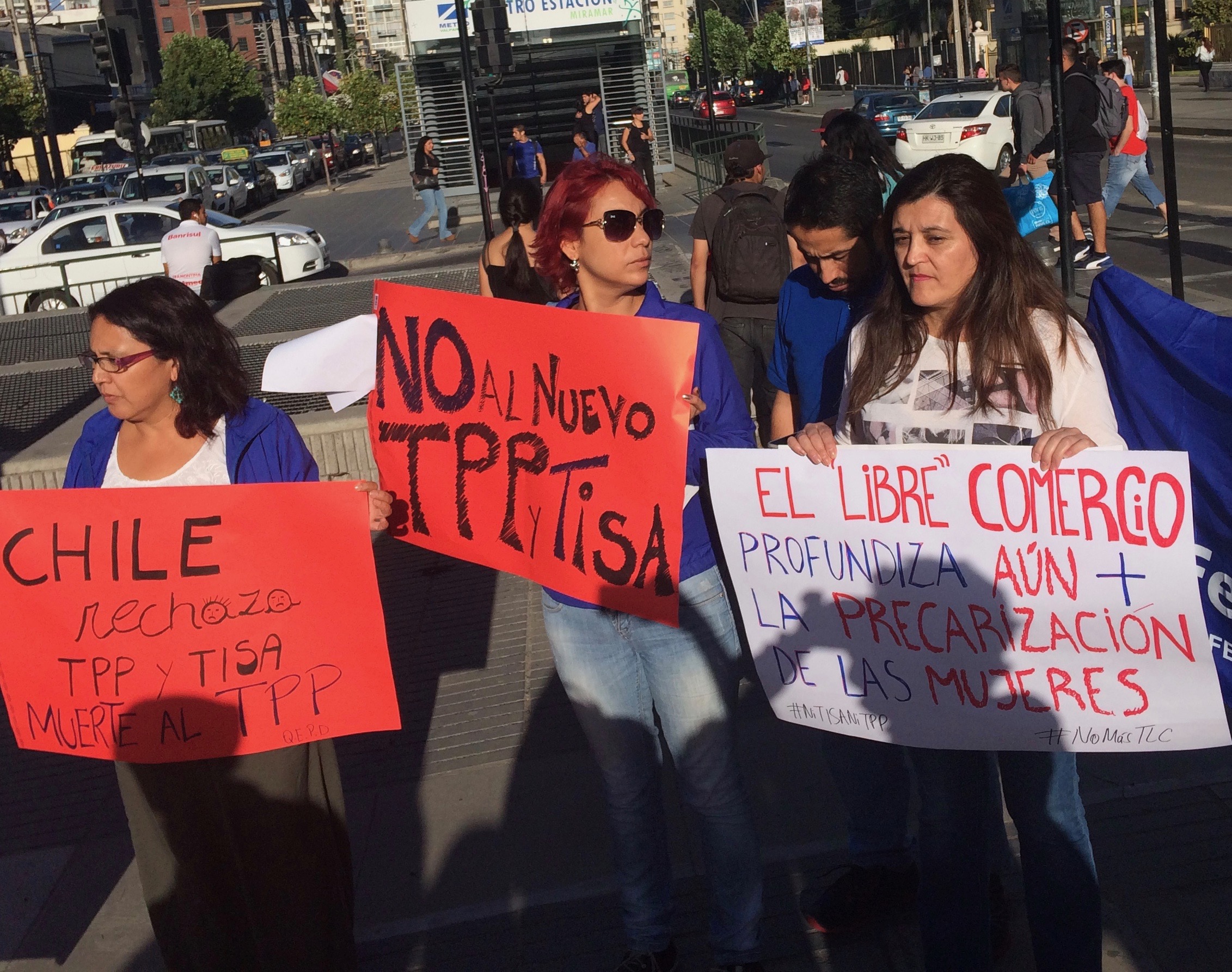Chileans protest bid to revive embattled TPP after Trump’s exit
Tele Sur | 14 March 2016
Chileans protest bid to revive embattled TPP after Trump’s exit
Activists have a message for trade ministers meeting in Chile: the TPP is dead.
Protests against the controversial Trans Pacific Partnership, quashed in the U.S. days after Donald Trump took office, are set to heat up once again Tuesday as trade ministers gather in Chile to discuss the future of the embattled deal and activists ramp up pressure to keep it buried.
Representatives of the 12 member states of the TPP together with China, Colombia and South Korea kicked off a two-meeting Tuesday in Chile’s Viña del Mar to discuss trade in the Asia Pacific region and the new outlook for economic cooperation after the United States’ exit from the TPP.
In response to the meeting, local social movements have called for protests Tuesday afternoon to pressure decision makers to steer away from breathing life back into the TPP, harshly criticized around the globe as a disaster for democracy, jobs, food security, affordable health care and the environment.
Ahead of the summit, over 200 social organizations penned an open letter to trade ministers attending the meeting in Chile, stressing that the dangers the TPP represented are proof it should not be upheld as a model for negotiating future trade deals.
“We believe that the TPP text, negotiated in secret, served the interests of large corporations at the expense of governments’ rights to regulate in the public interest and of our fundamental rights as citizens,” stated the letter, signed by global organizations like Friends of the Earth together with dozens of local groups from 15 different countries.
“We are better off without the TPP,” the letter continued, highlighting the how the deal vastly expanded the rights of corporations while undermining labor rights, climate change mitigation efforts and policies that protect Indigenous rights and other basic human rights.
“We urge you to accept that this model has failed, and to engage with us and others in a more open and democratic process to develop alternative approaches that genuinely serve the interests of our peoples, our nations and the planet,” the letter concluded.
Nineteen Chilean movements and organizations signed onto the open letter — many of the same organizations taking their demands to the streets Tuesday afternoon to protest the meeting and pressure decision-makers to accept that the TPP is dead.
But local activists are also concerned that trade policy could be headed in a worrying direction in the footsteps of the TPP, even if the deal itself is not resuscitated.
In an interview with Venezuela’s state-owned La Radio del Sur, a spokesperson of the movement Chile Better Without TPP, Esteban Silva Cuadra, argued that the government of President Michelle Bachelet has turned her back on the Chilean people by calling the meeting with representatives of TPP members states.
“What the Trans Pacific Partnership and bilateral and multilateral free trade agreements do is reduce a country’s food sovereignty and violate national laws in matters of production such as investment funds,” Cuadra explained, adding that the movement has called Chileans to take to the streets to protest the government’s trade policy that put corporate profits before people.
Chilean Foreign Minister Heraldo Muñoz described the meeting as an "important political signal in moments of uncertainty," calling for "greater clarity" as the country continues to pursue a "more open, more free" trade policy with "less protectionism."
While countries including Australia and New Zealand have expressed hope that the TPP could still be salvage by bringing more Asian nations into the deal, China said ahead of the summit Monday that the meeting is not about the TPP but Asia Pacific integration and cooperation more broadly.
Protesters are scheduled to march in Viña del Mar at 6:00 p.m. local time under the banner of rejecting the TPP or any similar free trade agreement.
Representing 40 percent of global GDP, the TPP participants includes Australia, Brunei, Canada, Chile, Japan, Malaysia, Mexico, New Zealand, Peru, Singapore, the United States, and Vietnam.






